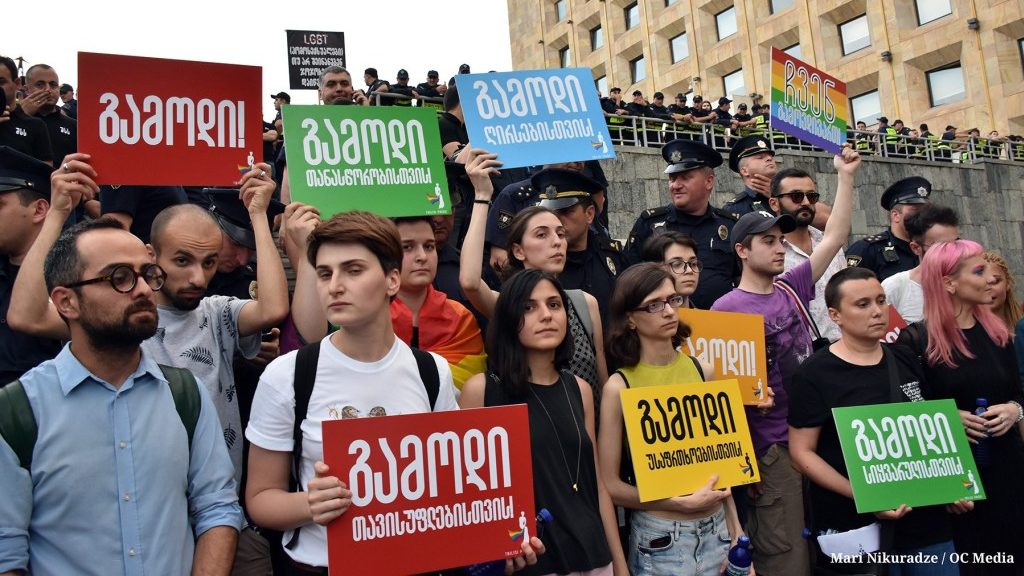Now Reading: Justice Served: Life Sentence in Shocking Murder of Trans Model Kesaria Abramidze
-
01
Justice Served: Life Sentence in Shocking Murder of Trans Model Kesaria Abramidze

Justice Served: Life Sentence in Shocking Murder of Trans Model Kesaria Abramidze
Life Sentence for the Murder of Beloved Trans Model Kesaria Abramidze
In a landmark verdict that has sent shockwaves through Eastern Europe, 26-year-old Beka Jaiani has been sentenced to life imprisonment after being found guilty of the brutal murder of transgender model and actress Kesaria Abramidze. The horrific crime, which took place in September 2024, has spotlighted the ongoing struggle for LGBTQ+ rights in Georgia.
The court heard devastating details of how Abramidze, 37, was stabbed more than 50 times in the neck during the attack in her Tbilisi apartment. The sheer brutality of the crime sent shockwaves through Georgia’s entertainment industry, where Abramidze had built a significant following.

A Relationship That Ended in Tragedy
According to local media reports, Jaiani and Abramidze had been in a relationship for approximately two years before the murder. Their connection was reportedly turbulent, with frequent conflicts preceding the fatal attack that occurred in September 2024.
Chilling CCTV footage presented during the trial captured Jaiani waiting by the elevator in Abramidze’s apartment building, then fleeing down the stairs less than ten minutes later. Neighbors who heard Abramidze’s screams discovered her blood-soaked body when they entered her apartment.
While Jaiani partially admitted guilt to the court, he vehemently denied accusations of particular cruelty or gender-based motivation behind his actions. The perpetrator was notably absent from the courtroom when the verdict was delivered, claiming his psychological state prevented him from attending.

A Rising Star Cut Down in Her Prime
Kesaria Abramidze had established herself as a pioneering figure in Georgia following her gender reassignment surgery in 2014. With more than half a million online followers, she had become an influential voice for transgender visibility in a region often hostile to LGBTQ+ individuals.
Her international recognition peaked when she proudly represented Georgia at the prestigious Miss Trans Star International pageant in 2018. Friends and fans have described Abramidze as a courageous trailblazer who refused to hide her identity despite the significant personal risks involved.
“Kesaria showed so many young transgender Georgians that visibility was possible,” said one LGBTQ+ activist who requested anonymity due to safety concerns. “Her murder has left a devastating hole in our community.”
A Pattern of Violence Amid Growing Anti-LGBTQ+ Sentiment
The tragic death of Abramidze marks the third high-profile murder of a transgender woman in Georgia in recent years, highlighting a disturbing pattern of violence against the transgender community. What makes this case particularly significant is its timing—occurring just one day after the Georgian parliament passed controversial legislation banning LGBTQ+ “propaganda.”
Human rights organizations have expressed concern over the growing hostility toward LGBTQ+ individuals in Georgia, with many seeing these legal restrictions as potentially emboldening violence against vulnerable communities. Abramidze’s murder sparked widespread protests in Tbilisi, with demonstrators calling for better protections for transgender individuals.
“This isn’t just about one tragic murder—it’s about a systemic problem,” said a spokesperson for a local LGBTQ+ rights organization. “When governments legitimize discrimination through legislation, it can create an environment where violence thrives.”

Legal Battle Continues as Defense Plans Appeal
Despite the life sentence handed down, this case appears far from over. Jaiani’s lawyer, Giorgi Mdinaradze, has already announced plans to appeal the conviction, claiming the verdict was “based solely on moral considerations rather than moral grounds.” The legal process is expected to continue as the defense challenges both the severity of the sentence and aspects of the prosecution’s case.
For Abramidze’s supporters, however, the life sentence represents a rare moment of justice in a system they feel often fails transgender victims. Vigils continue to be held in her memory, with many seeing her case as emblematic of the broader struggles faced by transgender individuals in Eastern Europe.
As Georgia continues to grapple with questions of LGBTQ+ rights and protections, the legacy of Kesaria Abramidze—and the brutal circumstances of her death—remain powerful symbols in an ongoing cultural and political battle over acceptance and equality.











